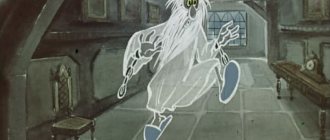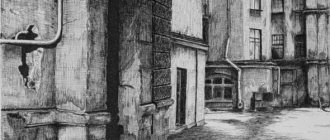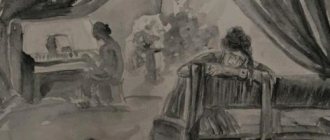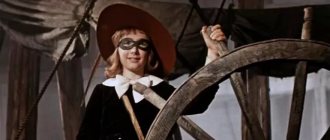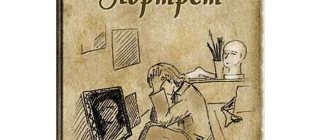The Picture of Dorian Grey
Chapter I
The thick aroma of roses filled the artist’s studio, and when a summer breeze rose in the garden, flying through the open door, it brought with it either the heady scent of lilac or the delicate fragrance of scarlet hawthorn flowers.
From the sofa covered with Persian saddle cloths, on which Lord Henry Wotton lay, smoking, as always, countless cigarettes one after another, only a broom bush was visible - its golden and fragrant, like honey, flowers glowed hotly in the sun, and its trembling branches seemed to could hardly bear the weight of this sparkling splendor; from time to time, on the long silk curtains of the huge window, fanciful shadows of birds flying past flashed, creating for a moment the resemblance of Japanese drawings - and then Lord Henry thought about the yellow-faced artists of distant Tokyo, who sought to convey movement and impulse through the means of art, which was static in nature. The angry buzzing of the bees, making their way through the uncut tall grass or monotonously and persistently circling over the curly honeysuckle showered with golden dust, seemed to make the silence even more oppressive. The dull noise of London came here like the hum of a distant organ.
In the middle of the room stood on an easel a portrait of a young man of extraordinary beauty, and in front of the easel, a little further away, sat the artist, the same Basil Hallward, whose sudden disappearance several years ago had so excited London society and aroused so many fantastic speculations.
The artist looked at the beautiful young man, whom he depicted with such skill in the portrait, and the contented smile did not leave his face. But suddenly he jumped up and, closing his eyes, pressed his fingers to his eyelids, as if wanting to retain some amazing dream in his memory and afraid of waking up.
“This is your best work, Basil, the best of all that you have written,” Lord Henry said lazily. “We definitely need to send her to an exhibition in Grosvenor next year.” It’s not worth joining the Academy: The Academy is too extensive and open to the public. Whenever you come, you meet so many people there that you don’t see the paintings, or so many paintings that you can’t see the people. The first is very unpleasant, the second is even worse. No, the only suitable place is Grosvenor.
“I’m not going to exhibit this portrait at all,” responded the artist, throwing back his head in his characteristic habit, which his comrades at Oxford University used to mock. - No, I won’t send him anywhere.
Raising his eyebrows in surprise, Lord Henry looked at Basil through the blue smoke rising in strange rings from his opium-soaked cigarette.
- Won’t you send me anywhere? Why so? For what reason, my dear? These artists are truly eccentric! They bend over backwards to achieve fame, and when fame comes, they seem to be burdened by it. How stupid this is! If it’s unpleasant when people talk about you a lot, then it’s even worse when they don’t talk about you at all. This portrait would raise you, Basil, much higher than all the young artists in England, and would inspire great envy in the old, if old people are still capable of experiencing any feelings at all.
“I know you will laugh at me,” the artist objected, “but I really can’t show off this portrait... I put too much of myself into it.”
Lord Henry laughed, making himself more comfortable on the sofa.
- Well, I knew that you would find this funny. Nevertheless, this is the absolute truth.
- Too much of yourself? By God, Basil, I did not suspect such conceit in you. I don’t see the slightest resemblance between you, my black-haired, stern-faced friend, and this young Adonis, as if created from ivory and rose petals. Understand, Basil, he is Narcissus, and you... Well, of course, your face is spiritual and all that. But beauty, true beauty, disappears where spirituality appears. A highly developed intellect is in itself a kind of anomaly; it disrupts the harmony of the face. As soon as a person begins to think, his nose becomes disproportionately elongated, or his forehead enlarges, or something else spoils his face. Look at the eminent figures of any scientific profession - how ugly they are! The exception is, of course, our spiritual shepherds, but these don’t bother their brains. The bishop, at eighty years old, continues to repeat what was instilled in him when he was an eighteen-year-old youth - naturally, his face retains beauty and good looks. Judging by the portrait, your mysterious young friend, whose name you stubbornly refuse to name, is charming, which means he never thinks about anything. I am absolutely convinced of this. He is probably a brainless and charming creature of God, which we should always have before us: in winter, when there are no flowers, to please the eyes, and in summer, to refresh our heated brain. No, Basil, don’t flatter yourself: you’re not at all like him.
“You didn’t understand me, Harry,” said the artist. - Of course, there is no similarity between me and this boy. I know this very well. Yes, I wouldn’t want to be like him. You shrug your shoulders, don’t believe it? Meanwhile, I speak quite sincerely. There is something fatal in the fate of people, physically or spiritually perfect - exactly the same fate throughout history has seemed to guide the erring steps of kings. It is much safer to be no different from others. In this world, fools and freaks always make money. They can sit quietly and watch others struggle. They are not given the opportunity to know the triumph of victories, but they are spared the bitterness of defeats. They live the way we all should live - without any worries, serenely, indifferent to everything. They do not destroy anyone and do not themselves die from the enemy’s hand... You are noble and rich, Harry, I have intelligence and talent, no matter how small, Dorian Gray has his beauty. And we will pay for all these gifts of the gods someday, we will pay with severe suffering.
- Dorian Gray? Yeah, so that's his name? asked Lord Henry, approaching Hallward.
- Yes. I didn't want to say his name...
- But why?
- How can I explain to you... When I love someone very much, I never tell anyone his name. It's like giving away some part of someone you love to others. And you know - I became secretive, I like to keep secrets from people. This is perhaps the only thing that can make modern life exciting and mysterious for us. The most ordinary trifle acquires amazing interest as soon as you begin to hide it from people. When I leave London, I now never tell my relatives where I am going. If I tell them, all the fun will be gone. It's a funny whim, I agree, but it somehow brings a fair amount of romance into my life. Of course, you will say that this is terribly stupid?
“Not at all,” objected Lord Henry. “Not at all, dear Basil!” You forget that I am a married man, and the only beauty of marriage is that both parties inevitably have to become more sophisticated in their lies. I never know where my wife is, and my wife doesn't know what I'm doing. When we meet - and she and I sometimes meet when we dine together at a party or visit the Duke - we tell each other all sorts of tall tales with the most serious look. My wife does it much better than me. She never gets confused, but this happens to me all the time. However, if she happens to catch me, she doesn’t get angry and doesn’t make a scene. Sometimes it even annoys me. But she's only making fun of me.
“I hate it when you talk about your family life in that tone, Harry,” said Basil Hallward, approaching the door to the garden. “I’m sure that you are actually a wonderful husband, but you are ashamed of your virtue.” You are an amazing person! Never say anything moral and never do anything immoral. Your cynicism is just a pose.
“I know that being natural is a pose, and the most hated pose by people!” - exclaimed Lord Henry with a laugh.
The young people went out into the garden and sat down on a bamboo bench in the shade of a tall laurel bush. The sunbeams slid across its shiny, varnished leaves. White daisies swayed gently in the grass.
The host and guest sat in silence for some time. Then Lord Henry looked at his watch.
“Well, unfortunately, I have to go, Basil,” he said. “But before I leave, you must answer the question I asked you.”
- What question? - asked the artist without raising his eyes.
- You know very well which one.
- No, Harry, I don't know.
- Okay, I'll remind you. Please explain why you decided not to send the portrait of Dorian Gray to the exhibition. I want to know the truth.
- I told you the truth.
- No. You said that there is too much of yourself in this portrait. But this is childish!
- Understand, Harry. - Hallward looked into Lord Henry's eyes. - Every portrait painted with love is, in essence, a portrait of the artist himself, and not of the one who posed for him. The artist reveals not him, but himself on the canvas. And I'm afraid that the portrait will reveal the secret of my soul. That's why I don't want to exhibit it.
Lord Henry laughed.
- And what is this secret? - he asked.
“So be it, I’ll tell you,” Hallward began somewhat embarrassed.
- Well, sir? “I’m burning with impatience, Basil,” insisted Lord Henry, looking at him.
“But there’s almost nothing to say here, Harry... And you’re unlikely to understand me.” You probably won't even believe it.
Lord Henry only grinned in response and, bending down, picked a pink daisy from the grass.
“I’m absolutely sure that I’ll understand,” he responded, carefully examining the golden pistil of the flower with a white edge. “And I am capable of believing in anything, and the more incredible it is, the more willingly.”
A passing breeze shook a few flowers from the trees; heavy lilac tassels, as if woven from stars, slowly swayed in the sleepy silence softened by the heat. A grasshopper was chattering against the wall. A dragonfly flashed through the air like a long blue thread on transparent brown wings... Lord Henry thought he could hear Basil’s heart beating in his chest, and he tried to guess what would happen next.
“Well, so...” the artist spoke, after a short silence. “About two months ago I had to attend Lady Brandon’s reception. After all, we, poor artists, should appear in society from time to time, if only to show people that we are not savages. I remember your words that in a tailcoat and white tie, anyone, even a stockbroker, can pass for a civilized person.
In Lady Brandon's drawing room, I talked for about ten minutes with noble widows dressed to the nines and with boring academics, when I suddenly felt someone's gaze on me. I looked around and that’s when I saw Dorian Gray for the first time. Our eyes met, and I felt myself turning pale. Some kind of instinctive fear gripped me, and I realized: in front of me was a man so charming that if I succumbed to his charm, he would swallow all of me, my soul and even my art. And I didn’t want any outside influences in my life. You know, Henry, what an independent character I have. I have always been my own boss... at least until I met Dorian Gray. Well, here... I don’t know how to explain it to you... An inner voice told me that I was on the eve of a terrible turning point in my life. I had a vague presentiment that fate was preparing extraordinary joys and equally exquisite torments for me. I felt creepy, and I was about to step towards the door, deciding to leave. I did this almost unconsciously, out of some kind of cowardice. Of course, trying to escape doesn't do me any credit. In all honesty...
“Conscience and cowardice are essentially the same thing, Basil.” “Conscience” is the official name for cowardice, that’s all.
“I don’t believe this, Harry, and I don’t think you believe it either... In a word, I don’t know from what motives, perhaps out of pride, since I am very proud,” I began to make my way to the exit. However, Lady Brandon, of course, intercepted me at the door. “Do you really intend to run away so early, Mr. Hallward?” - she screamed. Do you know what a shrill voice she has!
- Still would! “She is a real peacock, only without its beauty,” said Lord Henry, tearing the daisy with his long, nervous fingers.
“I couldn’t get rid of her.” She introduced me to the highest persons, then to various dignitaries in the stars and the Order of the Garter and some old ladies in huge tiaras and with hooked noses. She recommended me to everyone as her best friend, although she saw me for the second time in her life. Apparently, she took it into her head to include me in her collection of celebrities. It seems that at that time one of my paintings was a great success - in any case, they talked about it in penny newspapers, and in our time it is a patent for immortality.
And suddenly I found myself face to face with the very young man who at first sight had caused such a strange excitement in my soul. He stood so close that we almost collided. Our eyes met again. Here I foolishly asked Lady Brandon to introduce us. However, this, perhaps, was not such recklessness: all the same, even if we had not been introduced, we would inevitably have started talking to each other. I am sure about that. Dorian told me the same thing later. And he, too, immediately felt that it was not chance, but fate that brought us together.
“What did Lady Brandon tell you about this charming young man?” asked Lord Henry. “I know her way of giving a quick description of each guest.” I remember how she once led me to some formidable, red-faced old man, hung with orders and ribbons, and on the way, in a tragic whisper - probably heard by everyone in the living room - she told me in my ear the most stunning details of his biography. I simply ran away from her. I like to understand people myself, without the help of others. And Lady Brandon describes her guests exactly like an appraiser at an auction selling things under the hammer: she either tells you the most secret things about them, or tells you everything except what you would like to know.
- Poor Lady Brandon! “You’re too hard on her, Harry,” Hallward remarked absently.
- My dear, she tried to create a “salon”, but it turned out to be just a restaurant. Do you want me to admire her? Well, God bless her, tell me better, what did she say about Dorian Gray?
- She muttered something like: “A lovely boy... his poor mother and I were inseparable... I forgot what he does... I’m afraid it’s nothing... Oh yes, he plays the piano... Or the violin, dear Mr. Gray?” Both of us could not stop laughing, and this somehow immediately brought us closer.
“It’s not bad if friendship begins with laughter, and it’s best if it ends with it,” said Lord Henry, picking another daisy.
Hallward shook his head.
“You don't know what true friendship is, Harry,” he said quietly. - Yes, and real enmity is also unfamiliar to you. You love everyone, and loving everyone means loving no one. You are all equally indifferent.
- How unfair you are to me! exclaimed Lord Henry. Pushing his hat to the back of his head, he looked at the clouds floating in the turquoise depths of the summer sky and looking like disheveled skeins of shiny silk. - Yes, yes, outrageously unfair! I don't treat people the same way. I choose beautiful people as my close friends, people with a good reputation as my friends, and I only make smart enemies. You should choose your enemies most carefully. There is not a single fool among my enemies. All of them are thinking people, quite intelligent and therefore know how to appreciate me. Will you say that my choice is due to vanity? Well, perhaps that's true.
“And I think so, Harry.” By the way, according to your scheme, I’m not your friend, but just a friend?
“My dear Basil, you are much more to me than just a friend.”
- And much less than a friend? So, something like a brother, right?
- Oh no! I have no tender feelings for my brothers. My older brother doesn’t want to die, but the younger ones do just that.
- Harry! - Hallward stopped him, frowning his eyebrows.
- My friend, this is not being said entirely seriously. But I admit, I really can’t stand my family. This must be because we cannot stand people with the same shortcomings that we have. I deeply sympathize with the English democrats who are indignant at the so-called “vices of the upper classes.” People of the lower class instinctively understand that drunkenness, stupidity and immorality must be theirs.
privileges, and if any of
us
suffers from these vices, he thereby usurps their rights. When poor Southwark decided to divorce his wife, the indignation of the masses was truly magnificent. Meanwhile, I cannot guarantee that at least ten percent of the proletarians lead a virtuous lifestyle.
“In everything you’ve piled up here, there’s not a single word with which I can agree, Harry!” And you, of course, don’t believe it yourself.
Lord Henry stroked his chestnut beard and patted his black tasseled cane on the toe of his patent leather boot.
- What a true Englishman you are, Basil! This is the second time I have heard this remark from you. Try to express any thought to a typical Englishman - and this is a great imprudence! - so he won’t think to figure out whether this thought is right or wrong. He is only interested in one thing: whether you yourself are convinced of what you are saying. Meanwhile, the idea is important, regardless of whether the one who expresses it sincerely believes in it. An idea, perhaps, has the greater independent value the less the person from whom it comes believes in it, because then it does not reflect his desires, needs and prejudices... However, I am not going to discuss political, sociological or metaphysical issues with you. People interest me more than their principles, and most interesting of all are people without principles. Let's talk about Dorian Gray. Do you meet often?
- Every day. I would feel miserable if I didn't see him every day. I can't live without him.
- These are miracles! And I thought that all your life you would love only your art.
“Dorian for me now is all my art,” said the artist seriously. “You see, Harry, sometimes I think that there are only two important moments in the history of mankind. The first is the emergence of new means of expression in art, the second is the appearance of a new image in it. And the face of Dorian Gray will one day become for me what the invention of oil paints in painting was for the Venetians or the face of Antinous for Greek sculpture. Of course, I paint Dorian, draw, make sketches... But it’s not only that. He is much more to me than a model or sitter. I am not saying that I am not satisfied with my work, I will not assure you that such beauty cannot be depicted in art. There is nothing that art cannot express. I see that what I have written since I met Dorian Gray is well written, it is my best work. I don’t know how to explain this and whether you will understand me... Meeting with Dorian seemed to give me the key to something completely new in painting, revealed to me a new style of writing. Now I see things in a different light and perceive everything differently. In my art I can recreate life through means that were previously unknown to me. “The dream of form in the days when thought reigns,” who said that? I do not remember. And Dorian Gray became such a dream for me. The mere presence of this boy - in my eyes he is still a boy, although he has already passed twenty years... ah, I don’t know if you can imagine what
His presence means to me! Without suspecting it, he reveals to me the features of some new school, a school that will combine in itself all the passion of romanticism and all the perfection of Hellenism. Harmony of spirit and body - how wonderful it is! In our madness we separated them, we invented vulgar realism and empty idealism. Oh, Harry, if you only knew what Dorian Gray is to me! Do you remember that landscape for which Agnew offered me enormous money, but I did not want to part with it? This is one of my best paintings. And why? Because when I wrote it, Dorian Gray was sitting next to me. Some of his subtle influence on me helped me for the first time see in an ordinary forest landscape a miracle that I had always been looking for and could not find.
- Basil, this is amazing! I have to see Dorian Gray!
Hallward got up and began to walk around the garden. A few minutes later he returned to the bench.
“Understand, Harry,” he said, “Dorian Gray is simply a motive in art for me.” You may not see anything in him, but I see everything. And in those of my paintings in which Dorian is not depicted, his influence is felt most strongly. As I already told you, he seems to be suggesting a new way of writing to me. I find it, like a revelation, in the curves of certain lines, in the gentle charm of other tones. That's all.
“But why then don’t you want to exhibit his portrait?” asked Lord Henry.
“Because I involuntarily expressed in this portrait that incomprehensible love of the artist, which I, of course, never confessed to Dorian.” Dorian doesn't know about her. And he will never know. But other people could guess the truth, and I don’t want to bare my soul before their curious and short-sighted eyes. I will never let them look at my heart under a microscope. Do you understand now, Harry? I put too much soul, too much of myself into this painting.
“But poets are not as shy as you.” They know very well that it is profitable to write about love; there is a great demand for it. A broken heart goes through many editions these days.
- I despise such poets! exclaimed Hallward. — An artist must create beautiful works of art without introducing anything from his personal life into them. In this age, people think that a work of art should be some kind of autobiography. We have lost the ability to abstractly perceive beauty. I hope someday to show the world what an abstract sense of beauty is - and that is why the world will never see the portrait of Dorian Gray.
“I think you’re wrong, Basil, but I won’t argue with you.” Only hopeless idiots argue. Tell me, does Dorian Gray love you very much?
The artist thought.
“Dorian is attached to me,” he answered after a short silence. “I know I’m tied.” It’s understandable: I flatter him in every possible way. It gives me a strange pleasure to say things to him that I shouldn't say, even though I know I'll regret it later. In general, he treats me very well, and we spend whole days together, talking about a thousand topics. But sometimes he can be terribly insensitive, and he seems to really enjoy tormenting me. Then I feel, Harry, that I have given my whole soul to a man for whom it is like a flower in his buttonhole, an ornament with which he will please his vanity only one summer day.
“Summer days are long, Basil,” said Lord Henry in a low voice. “And perhaps you will be fed up before Dorian.” As sad as it may be, Genius is undoubtedly more durable than Beauty. That is why we strive to develop our mind beyond all measure. In the brutal struggle for existence, we want to preserve at least something stable, lasting, and we fill our heads with facts and all sorts of rubbish in the senseless hope of retaining our place in life. A highly educated, knowledgeable person is the modern ideal. And the brain of such a highly educated person is something terrible! It is like an antiques shop, filled with all sorts of dusty junk, where each thing is valued much higher than its real value... Yes, Basil, I still think that you will be the first to get fed up. One fine day you will look at your friend - and his beauty will seem a little less harmonious to you, you will suddenly not like the tone of his skin or something else. him for this
and in the most serious way you will begin to think that he is guilty of something towards you. On your next date, you will be completely cold and indifferent. And one can only really regret this future change in you. What you just told me is a real novel. One might say, a novel based on art. And having survived the romance of his former life, a man - alas! - becomes so prosaic!
- Don't say that, Harry. I have been captivated by Dorian for the rest of my life. You don't understand me: you are so fickle.
“Ah, dear Basil, that is why I am able to understand your feelings.” Those who are faithful in love only have access to its banal essence. The tragedy of love is experienced only by those who cheat.
Taking out an elegant silver matchbox, Lord Henry lit a cigarette with the smug and satisfied look of a man who managed to fit all worldly wisdom into one phrase.
Sparrows fussed and chirped among the shiny green ivy leaves, and the blue shadows of clouds, like flocks of swift swallows, glided across the grass. It was so nice in the garden! “And how fascinatingly interesting are people’s feelings, much more interesting than their thoughts! - Lord Henry said to himself. “Your own soul and the passions of your friends are the most interesting things in life.”
He remembered with secret pleasure that, having stayed late at Basil Hallward's, he had missed a boring breakfast at his aunt's. Lord Goodbody is no doubt having lunch with her to-day, and the conversation always revolves around the model dining-rooms and lodging-houses which should be opened for the poor. At the same time, everyone praises those virtues in which he himself does not need to practice: the rich preach frugality, and the idle eloquently spread about the great importance of work. How good it is that he is freed from all this for today!
The thought of his aunt suddenly brought back a memory to Lord Henry's mind. He turned to Hallward.
- You know, I just remembered...
- What did you remember, Harry?
— I remembered where I heard about Dorian Gray.
- Where? asked Hallward, knitting his eyebrows.
- Don't look at me so angry, Basil. It was my aunt, Lady Agatha's. She said that she had found a nice young man who promised to help her in the East End, and his name was Dorian Gray. Notice that she didn't say a word about his beauty. Women, at least virtuous women, do not value beauty. Auntie only said that he was a serious young man with a wonderful heart, and I immediately imagined a guy with glasses, straight hair, a freckled face and huge legs. It’s a pity, I didn’t know then that this Dorian was your friend.
“And I’m very glad that you didn’t know that, Harry.”
- Why?
- I don't want you to meet.
- Don't you want us to meet?
- No.
“Mr. Dorian Gray is in the studio, sir,” the footman reported, appearing in the garden.
- Yeah, now you will have to introduce us, willy-nilly! - Lord Henry exclaimed with a laugh.
The artist turned to the footman, who stood squinting from the sun.
“Ask Mr. Gray to wait, Parker: I’ll be there in a minute.”
The footman bowed and walked along the path to the house. Then Hallward looked at Lord Henry.
“Dorian Gray is my best friend,” he said. - He has an open and bright soul - your aunt was absolutely right. Watch out, Harry, don't spoil it! Don't try to influence him. Your influence would be disastrous for him. The world is great, there are many interesting people in it. So don’t take away from me the only person who breathed into my art the beauty that is in it. My entire future as an artist depends on him. Remember, Harry, I rely on your conscience!
He spoke very slowly, and the words seemed to come out of him against his will.
- What nonsense! - Lord Henry interrupted with a smile and, taking Hallward by the arm, almost forcibly led him into the house.
History of creation
The history of writing the novel “The Picture of Dorian Gray” will reveal many interesting facts to the reader:
- The nineteenth century in England went down in history under the name “Victorian era”. Along with the colossal achievements of scientific and technological progress and British diplomacy, a feature of this period was the establishment of the strictest moral and ethical framework in the highest circles of English society. The upper echelons of English society sought to refine their lives, to create a dazzling external effect, behind which, however, numerous vices and moral decay continued to be hidden.
- The art of decadence, in which Wilde himself worked, was born largely from the protest of part of the English intelligentsia against such a way of life, which cultivated hypocrisy, arrogance and snobbery. Instead of masking the ills of society, including their own depravity, the decadents sought to expose them, to put them on display, even finding some pleasure in it. Oscar Wilde drew inspiration for his creation from Gothic novels and dramatic works of the Enlightenment, among which was the well-known “Faust” by Johann Goethe, from which he emphasized mysticism and general gloom.
- The author wrote the novel in just two weeks and on a dare: he decided to prove that he could write the loudest book in record time, which absolutely everyone would talk about. He won the bet: The Picture of Dorian Gray became a stunningly famous and resonant creation, albeit with a minus sign. Most readers from the upper strata saw an insult addressed to them on the pages.
- Oscar Wilde was convicted for his novel and served in prison on charges of violating moral standards and insulting society. Yes, yes, Puritan England also valued its dignity too highly to allow it to be insulted without criminal prosecution.
Criticism
The writer's contemporaries not only did not accept Wilde's novel, but attacked it with angry criticism. The author's main opponent was the literary critic Henley, who, citing as an example the scandalous details of the life of Wilde, who in fact was a very controversial person, came to the conclusion that the novel was not intended to condemn debauchery, but to call for it. As a result, because of his creativity and dishonest lifestyle, Oscar Wilde was brought to trial and sentenced to prison.
In response to 216 printed responses to The Picture of Dorian Gray, Wilde wrote more than 10 open letters to the editors of British newspapers and magazines, explaining that art does not depend on morality.
Only after the death of the writer was the public able to take a fresh look at the novel, seeing in it not a piece of reading material that corrupts the minds of young people, but one of the most moral and witty English novels.
Author: Mikhail Shchepin
What does it teach?
The Picture of Dorian Gray makes you think about what a person can achieve if he gives in to his basest desires. From the novel, a person can learn the importance of self-control and restraint, and most importantly, honesty with oneself. The moral of the book is the need to accept your essence without cuts and admit your depravity, and not lead a double life for the needs of the day.
This work emphasizes the importance of real art, but at the same time speaks of how dangerous it is to spend your whole life chasing illusory beauty, avoiding the surrounding reality.
Genre and direction
Wilde worked in a completely new literary direction for world literature at that time, its name was modernism. The writer does not strive for a meticulous depiction of reality, placing the idea itself and the means of expressing it above the immediate realism of what is happening. The structure of the work is far from classical; the narrative is told in episodes and from several characters.
The genre of The Picture of Dorian Gray can be defined as a novel. The narrative covers a long period of time and includes a large number of characters. The events described in the novel have a significant impact on the world of the book itself and have significant consequences.
The main characters and their characteristics
The system of images and characteristics of the heroes in the novel “The Picture of Dorian Gray” are indicated in the table. The wise Litrekon can enrich it with new characters if you write who is missing?
| Dorian Gray | A beautiful and naive young man with golden curls. Dreamy and selfish. A driven and weak-willed person who is seduced by the permissiveness of hedonism. He is disgusted by the material world, preferring to hide from it in the world of aesthetics. Because of this, Sybil's true feelings disgust him, and his spiritual weakness and frivolity make him an easy prey for the tempter Lord Henry. |
| Lord Henry Wotton | Middle aged man. Aristocrat. Nihilist, cynic and libertine. At the same time, he is an extremely witty and pleasant person to talk to. Constantly speaks in aphorisms. Despite his disdain for all social norms, he manages to exist calmly in a society where everyone accepts and respects him. |
| Basil Hallward | Young man. A talented artist who values art and beauty more than anything else. Bows to Dorian Gray. Wanting to save his soul, he enters into battle with Wotton, but due to his indecision he suffers a crushing defeat, which leads to the fall of Dorian and the death of Basil himself. |
| Sybil Vane | A pretty and gifted girl. Actress of a seedy theater. Love for Dorian awakened sincere feelings in her. She began to despise the theater and her place in it, seeing the insincerity and pretense of everything that happened on stage. The girl tried to play the role of Juliet in a new way, putting her sincere feelings into this role, but neither the audience nor Dorian himself appreciated her performance. Dorian himself rejected Sybil, which pushed the girl to commit suicide. |
Problems
The issues in The Picture of Dorian Gray can be described in more detail if the reader tells the Many-Wise Litrecon what to add?
- Hedonism
- the writer takes particular pleasure in painting a picture of the debauchery and moral decay of English society. It is along this path that Lord Henry follows, followed by Dorian Gray and hundreds of other young people. Wilde shows that vice inevitably leads a person to complete collapse. Only exceptional people, like Lord Henry, are able to maintain balance and not destroy themselves. - The fate of the artist
- using the example of Basil, Oscar Wilde shows how art can influence people's lives, awaken feelings in them and show things as they really are. Unfortunately for the artist, the responsibility of a creator most often turns out to be too great for an ordinary person, and nothing but disappointment and suffering awaits a true artist. - Despair
– the hero’s outcome is natural. Having chosen the path of depravity and hypocrisy, Dorian Gray came to loneliness and despair, which drove him crazy and led to death. - The hypocrisy of bigotry
. Society is obsessed with ostentatious virtue, but in reality it only hides its true feelings behind the mask of the righteous. So, many of Lord Henry’s acquaintances first go to church, and then with a smile they catch every word of the atheist.
Themes
The themes in The Picture of Dorian Gray cover all the popular motifs in literature, but they are not revealed typically and with the skill of a real writer:
- Love
- using the example of Sibyl, Wilde shows how a feeling of love can make a person rethink his whole life, make him better and more sincere. But at the same time, the writer says that sincere emotions have no place in a society mired in vices and escapism. - Mysticism
– the plot is based on artistic assumption. The magical quality of the portrait created by Basil shows us the development of Dorian's character, his true feelings, and ultimately leads him to a tragic end. - Art
in the novel is strictly opposed to real life. The characters of the novel, Dorian and Basil, fundamentally refuse to live in the real world, which causes them fear and disgust. The author endows creativity with magical properties, forming a romantic dual world. Dorian's true character clashes with his deceptive angelic appearance, which is forever captured by the magical brush of a gifted artist. - Good and evil
- through the mouth of Lord Henry Wilde speaks about the relativity of traditional moral values and the very concepts of good and evil in a hypocritical society in which people strive only for external manifestations of virtue, while remaining insignificant and sinful inside. - Beauty
- according to the writer, real beauty exists only in art and is higher than real life. Anyone who wants to achieve true perfection must reject boring reality. Few people are capable of this, and only a few are able to achieve happiness in this way.

